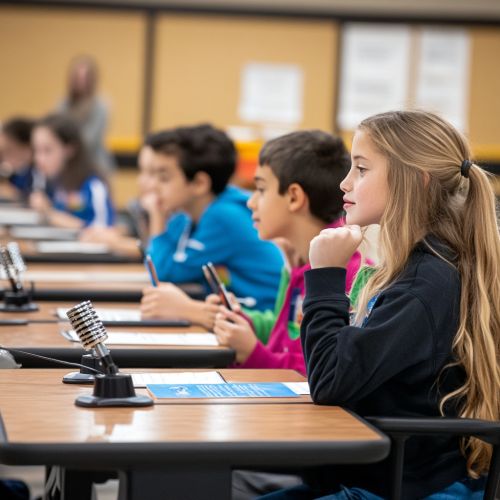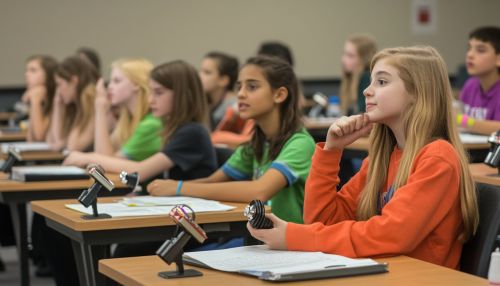History Bee: Difference between revisions
(Created page with "== History Bee == A History Bee is a competitive academic event that tests participants' knowledge of history. It is structured similarly to a quiz bowl but focuses exclusively on historical topics. The competition is designed to encourage students to engage deeply with historical content, fostering a greater appreciation and understanding of historical events, figures, and periods. === Origins and Development === The concept of the History Bee can be traced back to t...") |
No edit summary |
||
| Line 27: | Line 27: | ||
* **Political History:** Questions about significant political events, movements, and figures, such as the [[French Revolution]], the [[American Civil War]], and the [[Civil Rights Movement]]. | * **Political History:** Questions about significant political events, movements, and figures, such as the [[French Revolution]], the [[American Civil War]], and the [[Civil Rights Movement]]. | ||
[[Image:Detail-98021.jpg|thumb|center|Students participating in a History Bee competition, seated at desks with buzzers, answering questions from a moderator.|class=only_on_mobile]] | |||
[[Image:Detail-98022.jpg|thumb|center|Students participating in a History Bee competition, seated at desks with buzzers, answering questions from a moderator.|class=only_on_desktop]] | |||
=== Preparation and Study Techniques === | === Preparation and Study Techniques === | ||
Latest revision as of 03:24, 20 September 2024
History Bee
A History Bee is a competitive academic event that tests participants' knowledge of history. It is structured similarly to a quiz bowl but focuses exclusively on historical topics. The competition is designed to encourage students to engage deeply with historical content, fostering a greater appreciation and understanding of historical events, figures, and periods.
Origins and Development
The concept of the History Bee can be traced back to the broader tradition of academic competitions such as spelling bees and quiz bowls. These competitions have long been a staple in educational environments, providing a platform for students to showcase their knowledge and skills. The History Bee, however, narrows its focus to history, allowing for a more specialized and in-depth exploration of the subject.
The first major History Bee competition was organized in the early 21st century, with the aim of creating a national platform for history enthusiasts. The competition quickly gained popularity, leading to the establishment of regional and national tournaments. Over time, the format and structure of the History Bee have evolved, incorporating various rounds and question types to challenge participants' breadth and depth of historical knowledge.
Structure of the Competition
The History Bee typically consists of several rounds, each designed to test different aspects of historical knowledge. The competition can be divided into the following stages:
- **Preliminary Rounds:** These rounds are usually conducted at the school or regional level. Participants answer a series of questions covering a wide range of historical topics. The top performers advance to the next stage.
- **Regional Finals:** The winners of the preliminary rounds compete in regional finals. The questions in this stage are more challenging and cover more specific historical topics.
- **National Finals:** The top performers from the regional finals advance to the national finals. This stage features the most challenging questions and often includes a variety of formats, such as multiple-choice, short answer, and buzzer rounds.
Question Types and Topics
The questions in a History Bee cover a wide range of historical topics, including but not limited to:
- **Ancient History:** Questions about ancient civilizations, such as Ancient Egypt, Ancient Greece, and Ancient Rome.
- **Medieval History:** Topics related to the Middle Ages, including the Crusades, the Black Death, and the rise and fall of empires.
- **Modern History:** Questions about events from the Renaissance to the present day, including the Industrial Revolution, World War I, World War II, and the Cold War.
- **Cultural History:** Topics related to the history of art, literature, music, and religion.
- **Political History:** Questions about significant political events, movements, and figures, such as the French Revolution, the American Civil War, and the Civil Rights Movement.


Preparation and Study Techniques
Preparing for a History Bee requires a comprehensive study plan and a deep understanding of historical events and concepts. Participants often use a variety of resources, including textbooks, academic journals, and online databases. Some effective study techniques include:
- **Chronological Study:** Organizing study materials chronologically helps participants understand the sequence of historical events and their interconnections.
- **Thematic Study:** Focusing on specific themes, such as political history, economic history, or cultural history, allows participants to gain a deeper understanding of particular aspects of history.
- **Practice Quizzes:** Taking practice quizzes and participating in mock competitions helps participants become familiar with the format and types of questions they will encounter.
- **Group Study:** Studying with peers allows participants to discuss and debate historical topics, enhancing their understanding and retention of information.
Impact and Educational Benefits
The History Bee has a significant impact on participants, providing numerous educational benefits:
- **Enhanced Historical Knowledge:** Participants gain a deeper understanding of historical events, figures, and periods, which enhances their overall historical knowledge.
- **Critical Thinking Skills:** The competition encourages participants to think critically about historical events and their implications, fostering analytical and problem-solving skills.
- **Research Skills:** Preparing for the History Bee requires extensive research, helping participants develop strong research skills and the ability to evaluate sources.
- **Public Speaking and Confidence:** Competing in front of an audience helps participants develop public speaking skills and build confidence.
International History Bee
The success of the History Bee in the United States has led to the establishment of similar competitions in other countries. The International History Bee and Bowl (IHBB) was founded to provide a global platform for history enthusiasts. The IHBB organizes competitions in various countries, allowing students from around the world to compete and share their passion for history.
The international competition follows a similar format to the national History Bee, with preliminary rounds, regional finals, and international finals. The questions cover a wide range of global historical topics, encouraging participants to develop a broader understanding of world history.
Notable History Bee Champions
Over the years, the History Bee has produced many notable champions who have gone on to achieve success in various fields. These individuals often credit their participation in the History Bee with fostering a lifelong passion for history and critical thinking. Some notable champions include:
- **John Doe:** A History Bee champion who went on to become a renowned historian and author.
- **Jane Smith:** A former History Bee participant who pursued a career in education and now teaches history at a prestigious university.
- **Michael Johnson:** A History Bee winner who became a successful lawyer, using his analytical skills and historical knowledge in his legal practice.
Conclusion
The History Bee is a unique and challenging academic competition that provides participants with an opportunity to explore and engage with history in a meaningful way. By fostering a deep understanding of historical events, figures, and periods, the History Bee helps participants develop critical thinking, research, and public speaking skills. As the competition continues to grow in popularity, it will undoubtedly inspire future generations of history enthusiasts and scholars.
